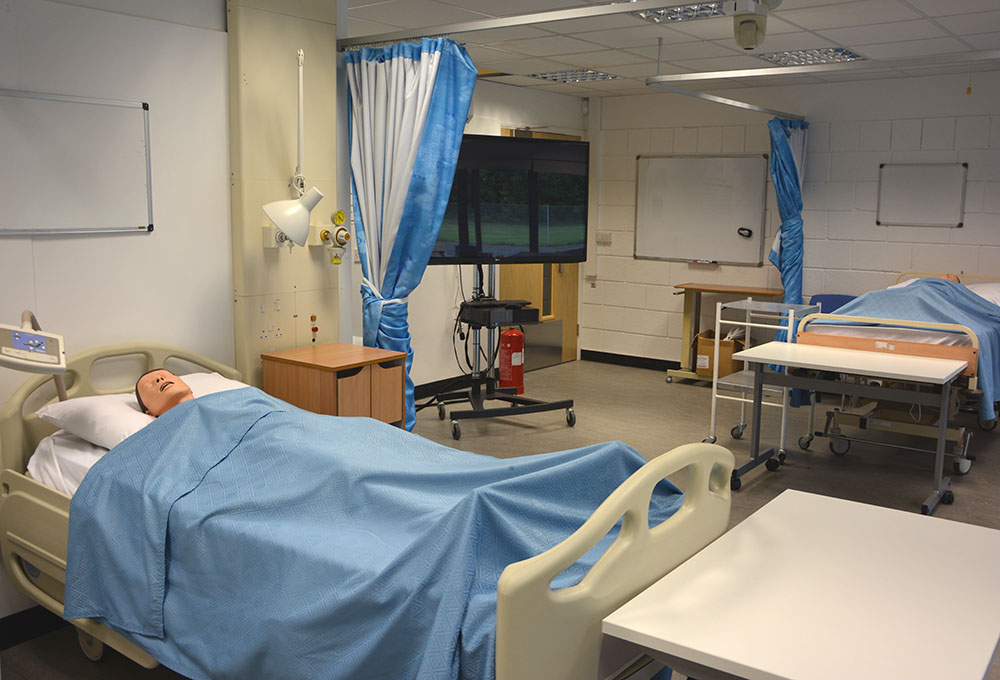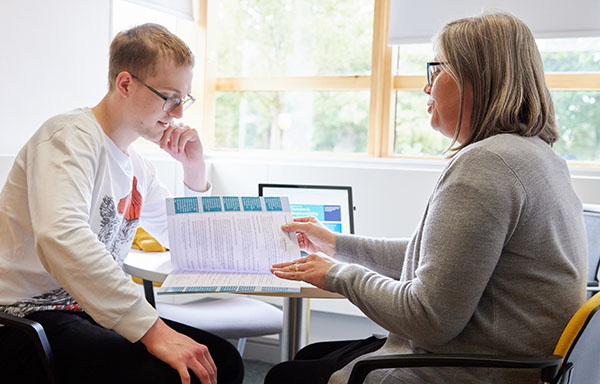The foundation year will build your knowledge of health topics, science and research. If you successfully pass the foundation year, you will be guaranteed progression onto our three-year nutrition and dietetics degree.
of students were positive about the teaching on the course
of students are in work and/or further study 15 months after graduating
The course is accredited by the British Dietetic Association (BDA) and is approved by the Health and Care Professions Council (HCPC).
You can join the British Dietetic Association as a student member whilst studying on the course. Successful completion leads to eligibility to apply for HCPC registration.
University of the Year finalist
Recognised for our graduate success, we’re shortlisted for University of the Year in the Times Higher Education Awards 2025.
Overview
Our integrated foundation course is your perfect preparation you for the undergraduate degree in nutrition and dietetics. A common misconception is that your previous qualifications must be scientific to become a dietitian. That is not true of this course. If your current qualifications don’t allow you direct entry to degree level, this pathway is for you. Successfully passing the foundation year guarantees your place on the remaining three years of our Nutrition and Dietetics BSc (Hons).
During your Foundation Year, you’ll get a solid grounding in science and healthcare-related topics.
By studying areas of human biology, psychology, sociology, and research, you’ll build the knowledge, skills and confidence you need to take the next step in your education and career. You’ll investigate key debates such as equality and accessibility in the healthcare, whilst being assessed through unique methods like podcasts.
Using lectures, food science hubs, laboratory work, tutorials and small group work, we'll ask you to actively participate to help you get the most from the course.
You will be taught alongside other Foundation Year students with an interest in other Allied Health specialists such as Occupational Therapy, Paramedic Science, Nursing, Radiography and Physiotherapy for the foundation year of the course before joining the other Nutrition and Dietetics BSc students for the remaining three years.
Placement
You will have placements or practice-based learning opportunities every year during the final three years of your degree. We aim to offer learners practice-based learning opportunities in a diverse range of settings throughout the final three years of the course. These are full-time and equate to 37.5 hours for practice per week.
There are no placements in the foundation year.
Course content
You’ll study theories backed up by substantial evidence and will then apply this learning in professional practice.
Throughout the course you’ll gain a broad range of experience in the field, working in our Ability House (a simulated home setting), a large teaching kitchen and science labs.
We regularly review our courses to reflect the latest research and developments in the subject area, as well as feedback from students, employers and the wider sector. As a result, modules may change to ensure the course remains current and relevant.
Careers
Nutritionists and dietitians are in demand in a variety of industries, so there are lots of exciting opportunities.
You could:
- Work in a hospital setting
- Support communities to embrace a healthy lifestyle
- Work for public health and support their campaigns
- Work for a professional sports club
- Become self-employed and set-up your own practice
- Move into research or training
You will also gain a science background and develop people skills during this course, making you employable in a wide range of areas.
Course highlights
Teaching and assessment
Teaching is a mix of interactive seminars, lectures, one-to-one tutorials and practical skills sessions. Your assessments will help prepare you for a career as a nutritionist and dietitian, and include observations of professional skills, writing reflective essays, presenting, group discussions and creating a dietary plan.
Teaching and assessment contents
Teaching and learning are student-centred, reflecting the philosophy of constructivism whereby students are active participants in their learning experience, and learn with and from each other. Methods of assessment reflect those likely to be encountered in dietetic practice and include assessment of knowledge, skill, application and evaluation in preparation for employment. Interdisciplinary modules at each year allow students to learn alongside occupational therapy and physiotherapy students to reflect real-world working.
Examples of learning and teaching methods used include:
- Lead lectures
- Practical classes and immersive simulation
- Seminars
- Tutorials
- Kitchen practical sessions
- Scientific laboratory sessions
- Problem-solving and group work
- Oral presentations
- Use of e-learning (pre-reading, pre-recorded lectures, self-assessment quiz, online discussions and synchronous virtual sessions)
- Case study-based scenarios.
Learning in the university setting is complimented by practical and clinical skill development, using the skills and simulation suite, Ability House (a simulated home setting), a large teaching kitchen and science labs. Valuable learning opportunities are provided using service users/carers and other professionals in both teaching and assessment strategies at all levels. With opportunities for interprofessional learning both within the university and the clinical practice setting, including during simulated practice where students work with a range of professionals including occupational therapists, physiotherapists, nurses and social workers.
Meet the team
You will be taught by a teaching team whose expertise and knowledge are closely matched to the content of the modules on the course.
Entry requirements
UCAS tariff points required: 32
The UCAS tariff points can come from 1 A-level (grade C or above) or an equivalent qualification. You will also need:
- GCSE English and Mathematics at grade c/4 or above
- Clear commitment to pursuing a career in Nutrition and Dietetics
- To be at least 18 years old
However, all applicants will be judged on their individual merits and we may take other skills, qualifications and life experience into account. We welcome mature students without the usual formal qualifications and will consider your application based on your suitability and preparedness to complete the Foundation Year.
The Nutrition and Dietetics BSc with Foundation Year course is aimed at individuals who may have few or no relevant formal qualifications but who can demonstrate a clear commitment to pursuing a career in nutrition and dietetics. Personal, professional and educational experiences will be considered to determine motivation and ability to progress onto the degree course.
Applicants who do not meet the minimum UCAS points requirement will be required to complete a written assignment task to assess their readiness for the course.
Any questions?
If you have any questions about entry requirements, please call our Admissions Office on 01905 855111 or email admissions@worc.ac.uk.
Fees
Fees contents
UK and EU students
In 2026/27 the standard fee for full-time home and EU undergraduate students on BA/BSc/LLB degrees and FdA/FdSc degrees is £9,790 per year.
Tuition fees are reviewed annually and may increase each year for both new and continuing students.
For more details on course fees, please visit our course fees page.
International students
In 2026/27 the standard tuition fee for full-time international students enrolling on BA/BSc/LLB degrees and FdA/FdSc degrees is £17,200 per year.
Tuition fees are reviewed annually and may increase each year for both new and continuing students.
For more details on course fees, please visit our course fees page.
How to apply
How to apply contents
Applying through UCAS
UCAS is the central organisation through which applications are processed for full-time undergraduate courses in the UK.
Read our how to apply pages for more information on the application process, or if you’d like to apply for part-time study.
Nutrition and Dietetics BSc (Hons) with Foundation Year - B4D2
Contact
If you have any questions, please get in touch. We're here to help you every step of the way.
Admissions Office
admissions@worc.ac.uk01905 855111More to explore
Open Days
Visiting us is the best way to get a feel for student life at the University of Worcester.

The City of Worcester
Worcester is a welcoming university city with great transport links and plenty of student parking.

Accommodation
Benefit from our accommodation guarantee. We have rooms on campus to suit every budget including en-suite options.














